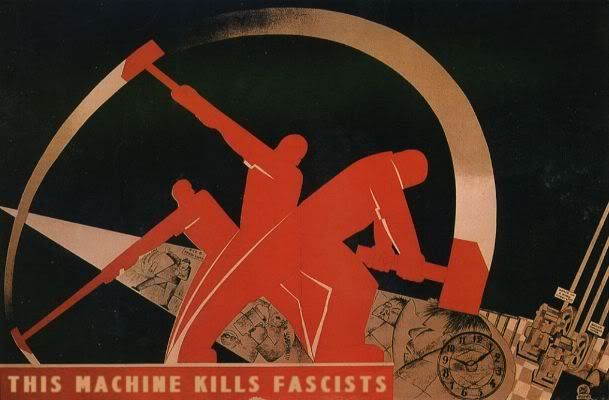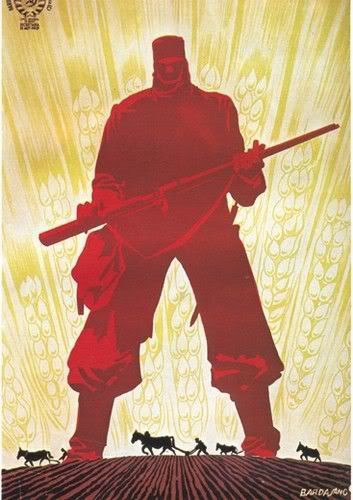Gangs, Drugs, and Police Repression: Remembering the Toledo Riots
When hundreds of Toledo residents mobilized in the streets to protest a neo-Nazi march through their neighborhood a year ago this October 15th, many found themselves in the midst of a full-scale cop riot. While city officials and the media were quick to blame the appalling situation on "gang violence," chaos only erupted after the police tried to block the protesters from legally demonstrating in their own neighborhood. The events that took place that day help to illustrate and important point: across the country, police repression is used to restrict the rights of individuals and organizations that actively struggle for social and economic justice.
From the Palmer raids of 1918-1921, to the FBI's infamous COINTELPRO operations of the 1950s-70s, to the recent establishment of the Department of Homeland Security, the US government has consistently attempted to undermine and destroy any protest groups in poor communities that seek to organize working people for radical change. Using infilration, police harassment, extralegal force, and outright violence, authorities have targeted groups such as the Black Panthers, the Young Lords, and the American Indian Movement, killing their members and railroading them into jail on fraudulent charges. More recently, on September 23, 2005, 78-year-old Puerto Rican independence leader Filiberto Ojeda Rios was shot in his home in Puerto Rico by FBI agents and then left to bleed to death. His murder sparked outrage among many Puerto Ricans who worry that the US administration will further crackdown on the island's independence movement. (To add insult to injury, the day of the FBI action took place on the 137th anniversary of the 1868 rebellion against Spanish colonial rule, one of the most important dates in Puerto Rican history.)
Apart from subverting nationalist and anti-capitalist organizations, the US government attempts to depoliticize inner-city communities by turning a blind-eye on drug trafficking. They allow the drug mafias to market their lethal products that ruin the social fabric of these areas and that prevent progressive political movements from emerging. In several cases, law enforcement agencies and the CIA have actually been caught working alongside overseas drug traffickers to flood poor neighborhoods with narcotics. One of the biggest of such conspiracies was uncovered in 1987, when a congressional committee led by John Kerry discovered that members of the Reagan administration and the CIA had been secretly financing the right-wing Contra paramilitaries in Nicaragua by helping them import drugs into California ghettos. Despite the fact that this was one of the most sordid scandals in the history of US foreign policy, when information about the scandal was made public the story was only picked up by four major US newspapers and did not make any front page.
When inner-city gangs and community groups speak out against drug use in their communities, they become targets of police harassment. For example, when the prominent black nationalist Sonny Carson established Black Men Against Crack in the early 1980s which shut down several crack houses in Brooklyn, NY, three of the organization's leaders were framed on fabricated weapons charges and sent to prison. Similarly, when Crips leader Dewayne Holmes successfully organized a truce between Los Angeles gangs in 1992, he was soon after arrested for allegedly stealing ten dollars, given an incompetent public attorney and an unfair trial, and sentenced to eight years imprisonment. The LAPD also undermined the gang truce by breaking up the gang peace meetings that were taking place throughout the city in the wake of the LA riots.
Law enforcement agencies across the country make a conscious and concerted effort to attack and harass progressive individuals and organizations that exercise leadership in their communities. At the same time, they instigate gang wars and promote petty crime and prostitution in working class areas. The police are responsible for some of the most shameful and outrageous violations of civil rights in our country, but they go unpunished because they are the agents of the state with the overriding goal of protecting the interests of the ruling class.
Yet people across the country are not sitting idle while their rights are being trampled upon. The events in Toledo occurred at the same time as hundreds of thousands of people, overwhelmingly black, rallied in Washington at the Millions More Movement. Both of these events demonstrated that racial and class tensions in America are reaching a critical point. Working people are showing a greater readiness to mobilize in defense of their interests, and are coming to understand that the root cause of our nation's problems is our thoroughly corrupt, rotten capitalist system.



1 Comments:
I returned the favor, and linked back you to you.
Really good post.
It has been proven, during times when political activism rises, particularly in ghettos as Harlem, the more drugs flow in.
Regards.
Post a Comment
<< Home